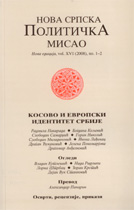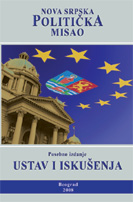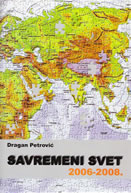| NSPM in English | |||
Resetting Russia |
 |
 |
 |
| petak, 10. jul 2009. | |
|
(The National Interest, 07.06.2009)
Unfortunately, President Barack Obama will not have that luxury when he travels overseas, first to his summit meeting with Russian President Dmitry Medvedev, and then on to Italy for the annual G-8 meeting. The Senate’s timetable will complicate Obama’s efforts to reach agreements with other states - increasing the likelihood that this major trip will be long on symbolism and public relations and short on substance. Despite the fact that it was recently lifted, the temporary hold placed by Senator Jon Kyl on Ellen Tauscher’s nomination to be undersecretary of state for arms control and international security reflected the unease of some within that body about proceeding with a new strategic-arms-reduction agreement with Russia before the United States has completed its own nuclear posture review. It certainly sends a signal to Moscow that even though the current START-II treaty expires at the end of the year, the U.S. negotiators may not be prepared to really negotiate the hard issues if the senate - where any treaty ultimately must be sent for ratification - is not yet prepared to commit itself to a new arms-control framework. It lessens the pressure for moving rapidly right now. A better strategy for Russia is to wait for the U.S. posture review and to assess what the atmosphere inside the senate. So the president is unlikely to walk away from Moscow with a major breakthrough in hand to demonstrate how his “reset” toward Russia is paying dividends. Nor, in the one area where the United States does possess both economic and security leverage to alter Russian behavior, can the president even make an offer. I’m speaking of reviving the U.S.-Russia civil nuclear deal which died last year without even being considered by the senate. (And then-Senator Joe Biden said such an agreement could never come into effect without a major shift in Russia’s course.) As the U.S. experience with India showed, a 123 agreement can lead to some changes in the policies of the other state - and Russia certainly would enjoy tangible benefits from such an agreement with the United States. I could foresee Moscow agreeing to some compromises to get such an arrangement, but Obama has no way of “delivering” the senate’s acquiescence. So this potential tool won’t be taken out of the toolbox next week. Then the president heads to Italy, where he won’t be in a position to reassure his European, Canadian and Japanese counterparts about what the U.S. policy on climate change will actually be. Senator George Voinovich’s blunt assessment that the American Clean Energy and Security Act contains a good deal of “crap” that will significantly delay its potential passage is not the message Obama wants heard in Europe on the eve of the G-8. One thing likely to be watered down: committing the United States to a 17 percent reduction in fossil-fuel emissions from their 2005 levels. Given a bipartisan coalition of senators from agricultural and heavy-industrial states will want either to lower standards or otherwise enact measures to protect U.S. firms that other nations might interpret as veiled protectionism, it does not inspire confidence that the other G-8 states will make concessions up front. Canada and Russia, often called the “bad boys” of the G-8 in terms of their own lackluster performance on emissions control, certainly aren’t going to get ahead of the United States until they see what the senate ends up doing to the president’s bill. The G-8 meeting is also going to tackle the question of sanctions on Iran. In the absence of a major improvement in U.S.-Russia relations, however, Moscow’s incentives for tightening the screws on Tehran are limited. The G-7 group might come to some sort of consensus approach - which would be better than nothing - but the G-8 summit is not going to lead to a stronger set of pressures on Iran (just as the G-8 last year in Japan was unable to agree on a common set of policies regarding Zimbabwe). Things might be different if Obama was traveling to Europe with a climate-change bill ready for signature on his desk and with polling showing clear majorities in favor of moving rapidly on a new arms-control treaty and on improving U.S.-Russia relations. But the senate is traditionally a slow-moving body. Unfortunately for Obama, its timing will undercut his bargaining position on this trip. So while the visuals and public relations may be spectacular, I have no great expectations. (Nikolas K. Gvosdev, a senior editor at The National Interest, is a professor of national-security studies at the U.S. Naval War College. The views expressed are entirely his own) |
Od istog autora
- Russia’s Foreign Policy: What’s Next?
- Turning Russia into a Euro-Atlantic Stakeholder
- Engaging the Southern Democracies
- Shaping the Multipolar World
- The Realist Prism: The Ukraine That Might Have Been
- What the United States Can Learn From the Soviet War in Afghanistan
- The Realist Prism: Horse Trading with Beijing
- Facing the Facts on Terror
- Reagan Plagiarized
- Moving NATO Forward
Ostali članci u rubrici
- Playing With Fire in Ukraine
- Kosovo as a res extra commercium and the alchemy of colonization
- The Balkans XX years after NATO aggression: the case of the Republic of Srpska – past, present and future
- Iz arhive - Remarks Before the Foreign Affairs Committee of the European Parliament
- Dysfunction in the Balkans - Can the Post-Yugoslav Settlement Survive?
- Serbia’s latest would-be savior is a modernizer, a strongman - or both
- Why the Ukraine Crisis Is the West’s Fault
- The Ghosts of World War I Circle over Ukraine
- Nato's action plan in Ukraine is right out of Dr Strangelove
- Why Yanukovych Said No to Europe

.jpg)








 One of my favorite scenes in the movie Patton (1970) occurs when the legendary general has his staff add the third star to his uniform. Omar Bradley - played by the recently-departed Karl Malden - looks on in amazement. Patton (George C. Scott) says, “What’s the matter, Brad? I’ve been nominated by the president.” Bradley’s response: “I know, but it doesn’t become official until it’s approved by the Senate.” Patton’s classic response, “Well . . . they have their schedule, and I have mine.”
One of my favorite scenes in the movie Patton (1970) occurs when the legendary general has his staff add the third star to his uniform. Omar Bradley - played by the recently-departed Karl Malden - looks on in amazement. Patton (George C. Scott) says, “What’s the matter, Brad? I’ve been nominated by the president.” Bradley’s response: “I know, but it doesn’t become official until it’s approved by the Senate.” Patton’s classic response, “Well . . . they have their schedule, and I have mine.”












